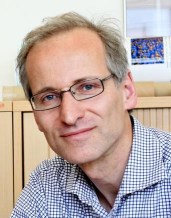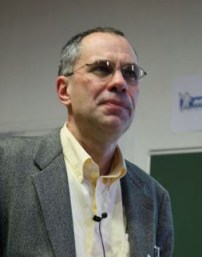SoMaS Summer School 2014: Scientific Programme
 A few enthusiastic young researchers will have the opportunity to expose, during a round table discussion with two distinguished scientists, Prof. Mark Ediger and Prof. Matthias Fuchs, their long-term research projects based on their current results in soft matter science. This discussion will be held on the stage of the lecture hall, with the participation of all attendees of the summer school, who will contribute to these discussions through questions and comments.
A few enthusiastic young researchers will have the opportunity to expose, during a round table discussion with two distinguished scientists, Prof. Mark Ediger and Prof. Matthias Fuchs, their long-term research projects based on their current results in soft matter science. This discussion will be held on the stage of the lecture hall, with the participation of all attendees of the summer school, who will contribute to these discussions through questions and comments.
For this "Master Class" the researchers will be selected by the scientific committee of the school. They have to send their presentation (not longer than 15min, in pdf format) and a file containing additional explanation of the scientific background of their research. This presentation should make clear that the presented research is of high quality and significant novelty. The research must be, in a broad sense, within the field of expertise of the masters of the class. Applications not meeting these criteria cannot be considered.
Each selected participant will be invited to give a talk (i.e., the Master Class may be considered as an invited talk at a conference).
Each presentation will start with a short (max 2 min), purely verbal introduction (no support by slides!) addressing the following points: (1) What is the research topic? (2) Why is this interesting? (3) Which methods have been used? (4) Which main results have been obtained or are expected? (5) So what? The aim of this synopsis is to raise the interest of the audience for the following presentation (not longer than 15min). This presentation will be often interrupted by the masters who ask questions, provide comments or advice, or involve the audience in the discussion.
LECTURES, RESEARCH AND REWORK SEMINARS
Every lecture (3 hours altogether) will be illustrated by two research seminars (see list of invited speakers) and a “rework” seminar during which the young researchers shall explore the topic more deeply with the lecturer after having gone through his/her lecture.
Glass-forming polymer films
Simone Napolitano, Bruxelles, Belgium
- Introduction to the glassy dynamics
- Dielectric Spectroscopy - principles and applications
- Glass transition under 1D confinement
- Segmental dynamics of thin films of soft matter - packing frustration vs interparticle correlations
Structure formation in soft matter hybrid materials
Stephan Förster, Bayreuth, Germany
- Basics of self-assembly
- Classical and non-classical nucleation and growth, biomineralization
- Frustration and defects in soft matter: para-, meso- and quasicrystals
- (Ultra)fast time-resolved experiments to follow nano- and mesoscale structure formation in-situ
Quiescent and sheared colloidal suspension
Eckhard Bartsch, Freiburg, Germany
- Introduction to the Physics of Colloidal Suspensions
- Light Scattering Methods – Basic Concepts and Simple Applications
- Quiescent Colloidal Suspensions – Phase behaviour, Structure & Dynamics
- Colloidal Suspensions under Shear – Application of Special Light Scattering Methods
POSTER SESSION
All students shall present a poster during the poster session. The posters will be put up at the beginning and will be displayed for the whole time of the school. Regarding the poster session please send an abstract (one page) presenting the results and the main questions of your research project and the strategies to solve them.
CAREER PROSPECTS
Several sessions will be dedicated to career perspectives. A broad range of career opportunities will be addressed like science research in the industry, science communication, etc… We plan also a session dedicated to the preparation of the job interview.


